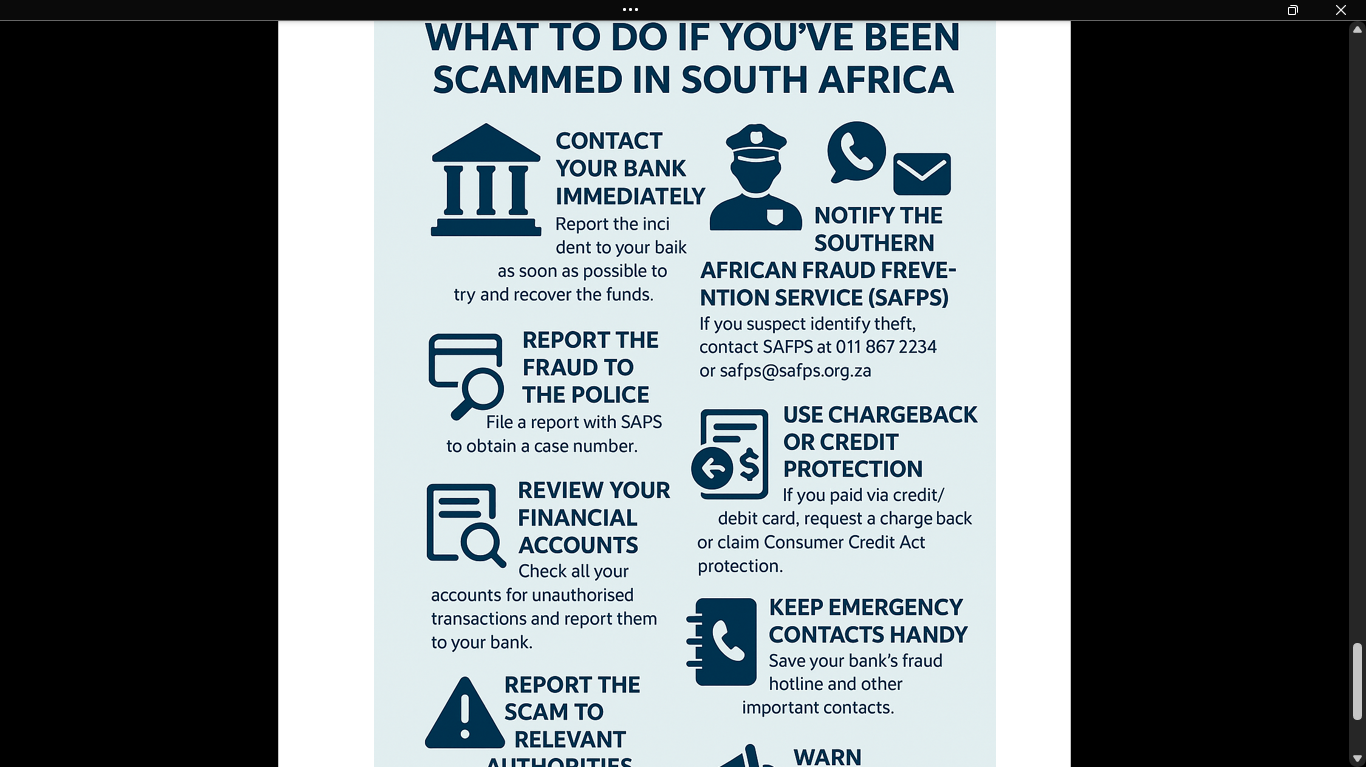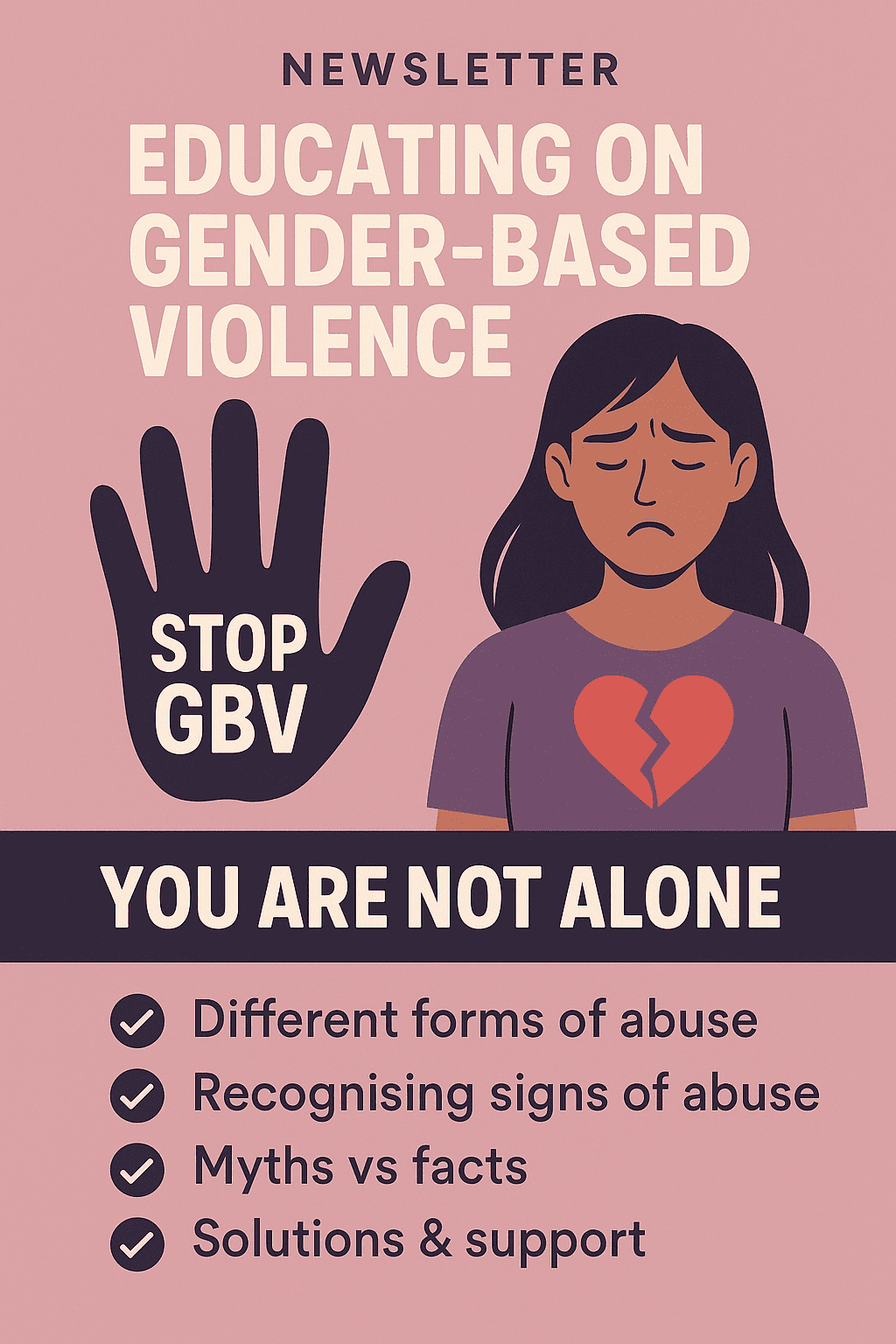Protecting Yourself from Phishing and Fraud
In today’s digital world, scammers are always looking for new ways to trick people online. Phishing and fraud are common scams that can harm both individuals and businesses. They use fake emails, messages, and websites to steal personal details or money or to access systems.
Understanding how these scams work and learning from real-life examples can help individuals and businesses protect themselves.
What is Phishing?
It’s when a scammer pretends to be a trusted person (e.g. a bank or government office) to trick you into sharing personal info like passwords, banking details, PIN, or credit card numbers. They might send fake emails or messages asking you to click a link or enter your information.
Common Methods of Phishing:
- Fake emails or SMSs ("smishing")
- Lookalike websites
- Social media messages
- Phone calls pretending to be customer support ("vishing")
Some real-life examples of Phishing in South Africa
1. Bank SMS Scam
Scammers sent fake SMSs that appeared to come from the bank, warning customers about "fraudulent activity" on their accounts. Victims were asked to click a link to "verify" their details, which led to a fake site where their banking info was stolen.
2. e-Toll Phishing SMS
People received SMSs claiming they owed SANRAL e-toll fees. They were directed to a link to “make a payment” — but it was a phishing page designed to steal banking details.
3. SARS Tax Refund Scam
Phishing emails and SMSs impersonating the South African Revenue Service (SARS) claimed the recipient was due a tax refund. Victims were tricked into entering personal and banking info into fake SARS portals.
4. Netflix / DSTV Subscription Scam
Cybercriminals sent fake emails or SMSs claiming your Netflix or DSTV subscription was expiring. Victims were lured to “renew” it by entering card info on a fake payment site.
What is Fraud?
Fraud is a broader type of scam that includes phishing, fake investment deals, and identity theft. Criminals use different tricks to make people give them money or personal details.
It can happen online or in person and includes things like fake investments, impersonation, and false billing.
Common Types:
- Identity theft
- Fake loan or job offers
- Pyramid/Ponzi schemes
- Insurance or tax fraud
Real-life Example in South Africa:
1. Thabo Bester & Dr. Nandipha Case
Thabo Bester, a convicted criminal, faked his death in prison with the help of Dr. Nandipha Magudumana. They committed various frauds, including scamming people out of large sums of money through fake businesses and identities. The case shocked the nation and highlighted how deep fraud can go.
2. Mirror Trading International (MTI) – Bitcoin Ponzi Scheme
MTI was a massive cryptocurrency scam that promised returns of up to 10% monthly using AI trading bots. Thousands of South Africans invested in Bitcoin — and over R9 billion disappeared when the scheme collapsed. It was labelled one of the biggest crypto scams globally.
3. National Lotteries Commission Scandal
Funds intended for charities and development were fraudulently diverted to luxury homes, cars, and personal expenses. Investigations uncovered fake documents and shell companies being used.
https://groundup.org.za/article/siu-investigates-r14-m-dodgy-projects-linked-to-former-board-member/
https://groundup.org.za/article/how-lottery-used-ethics-company-to-launder-money/
4. Fake Job Offers on Gumtree or Facebook
Fraudsters post fake job ads and ask applicants to pay a “registration” or “uniform” fee upfront. After payment, the “employer” disappears, and the job doesn’t exist.
5. SIM Swap Fraud
Scammers do a SIM swap using stolen ID numbers and banking info to take over your phone number. Then they intercept your OTPs (One-Time Pins) to access and drain your bank account.
6. Pension Fund / UIF Payout Fraud
Some scammers pose as “agents” who promise to help people access their pension or UIF benefits — but they charge upfront fees or steal your ID details to commit further fraud.
Warning Signs of Scams:
- Too Good to Be True: If something sounds too good to be true, it probably is. Be careful of promises that seem too easy or unrealistic.
- Pressure to Act Quickly: Scammers try to get you to act fast. They create a sense of urgency, so you don’t have time to think.
- Asking for Personal Information: Be careful if someone asks for your personal information like your bank details, password, or ID number, especially if you weren’t expecting it.
- Unknown or Strange Sources: Be careful with messages or phone calls from people or companies you don’t know, especially if they sound unprofessional.
- Secrecy or “Don’t Tell Anyone”: Scammers often want you to keep the deal a secret. This is a big red flag.
- Messages that say you've ‘won’ a prize, lottery, or a giveaway: These are normally scams, especially if you never entered.
Practical Tips to Stay Safe
To protect yourself from phishing and fraud, follow these tips:
- Check Emails and Messages: If you get a message from a company asking for your details, call the company directly using their official contact number to check if it is real before you give out any details.
- Use Extra Security Steps: Set up two-factor authentication (MFA) to make it harder for scammers to hack your accounts.
- Use strong passwords and avoid clicking on strange links. Make sure your computer or phone has antivirus protection.
- Keep Your Software Updated: Update your apps and security software to stay protected.
- Learn About Scams: Stay updated on the latest scams and tell your friends and family. If someone offers you something that sounds too good to be true, take time to look it up. If you're unsure, speak to someone you trust — whether it's a tech-savvy family member or a friend. Don't be afraid to ask for help.
You can also do an online search to see if anyone has reported it as a scam. You can use websites that help identify scams, like the South African Banking Risk Information Centre (http://www.sabric.co.za), to see if an offer is real.
- Watch Your Money: Check your bank statements often and report anything strange.
- Check the sender’s email or number — scammers use lookalike domains like @absabank.co.za instead of @absa.co.za
- Don’t click suspicious links: Hover over them to preview where they go.
- Watch for urgent language: “Act Now!”, “Your account is blocked!”, etc.
- Check spelling & grammar: Phishing messages often have weird errors.
What to Do If You’ve Been Scammed in South Africa
Here are some steps you can take:
- Contact Your Bank Immediately
Report the incident to your bank as soon as possible to block further transactions and attempt to recover any stolen funds.
- Report the Fraud to the Police
File a report with the South African Police Service (SAPS) to obtain a case number. This is often needed for follow-up investigations or insurance claims. safps@safps.org.za - Notify the Southern African Fraud Prevention Service (SAFPS)
If you suspect identity theft, contact SAFPS to protect your identity from further misuse. - SAFPS Contact Info:
☎️ 011 867 2234
✉️ www.safps.org.za
- Use Chargeback or Credit Protection
If you paid using a credit or debit card, contact your bank to request a chargeback or claim protection under the Consumer Credit Act. - Review Your Financial Accounts
Carefully check all your bank and credit accounts for any unauthorised activity. Report anything suspicious to your bank immediately. - Report the Scam to Relevant Authorities
- Financial Intelligence Centre (FIC): Forward scam emails or messages to
- ✉️ http://www.fic.gov.za/scams-awareness/
- Scam reporting hotline: ☎️0800 997 263
- Keep Emergency Contacts Handy
Save your bank’s fraud hotline and other important contact numbers in an easily accessible place in case of future suspicious activity. - Warn Others
Let your family, friends, and colleagues know about the scam so they can avoid becoming victims too.
Conclusion
Phishing and fraud can cause serious harm, but learning how they work can help you stay safe. Always check emails carefully, don’t share personal details with strangers, and stay informed about scams.




